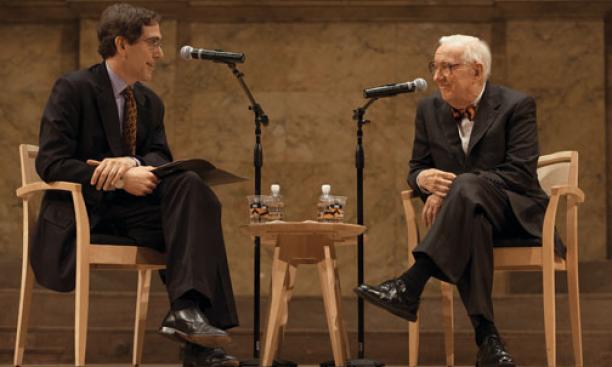

Retired Supreme Court Justice John Paul Stevens dissented from the majority in more than half of 1,400 opinions he wrote during his 34 years on the court. But when asked during an Oct. 10 campus appearance if he was optimistic about the future of the court and the Constitution, Stevens responded with an unequivocal “Yes.”
Stevens’ conversation with Provost Christopher Eisgruber ’83, a former law clerk to Stevens, drew a full house in Richardson Auditorium. Stevens sported an orange-and-black bow tie he had received from Troy McKenzie ’97, another of his former law clerks.
In true fashion, he didn’t hesitate to disagree with some of the court’s decisions. On Bush v. Gore, which resolved the 2000 presidential election, he said, “I thought at the time, and I still do, that the particular decision was quite wrong.” He said
he thought it “threatened the public perception of the court as an impartial adjudicator.”
Stevens took issue with a decision of his own: “The one case on which I definitely would have voted the other way is the constitutionality of the Texas capital-punishment statute,” he said. He voted with the majority in 1976 to reinstate the death penalty. Today, he has a different view: “In my judgment, having thought about it for many years, it does more harm than good.”
The former justice came to the defense of Justice Samuel Alito ’72, who visibly disagreed with President Barack Obama during his 2010 State of the Union address. Obama criticized the court for a decision protecting contributions by corporations — including, he said, “foreign entities” — to political campaigns. Cameras caught Alito appearing to say, “Not true.”
Stevens said he agreed with the president’s assessment of the implications of the ruling, but said Alito’s point “was also a correct thing to say, because in a way the president was interpreting the thrust of the reasoning of the opinion rather than anything that had been said in the majority.”
Despite some bitter divides on cases, Stevens described the Supreme Court as “a very nice place to work” and added: “I think all members of the court like and actually respect one another.”
